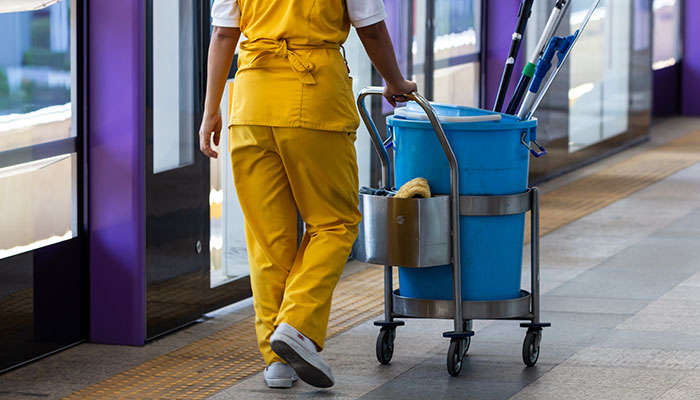New essential workers have joined the traditional health and emergency staff familiar to the frontline of community crises. These people – the cleaners, drivers, supermarket shelf stackers and servers – are working in crucial roles, while sometimes also dealing with anxious, abusive customers and simultaneously worrying about contracting Covid-19 … and then infecting families at home.

The new guard: workers making it possible for us to shop for food, and receive deliveries and clean spaces for us during the pandemic are experiencing stress as anxious customers sometimes become abusive, says Professor Nick Titov.
Last week, the NSW government expanded its coughing and spitting Public Health Order to protect non-traditional frontline stuff after several 'vile' incidents reported by supermarket and transport personnel. The $5000 fine had previously only applied to frontline personnel including nurses, doctors, police, pharmacists and paramedics.
Macquarie University Professor Nick Titov is executive director of mental health clinic MindSpot, and has been working with traditional and new frontline workers on a set of psychological tips to reduce their stress.
“So many people across the Australian community are stepping up in very exceptional circumstances and people need to acknowledge that what they are doing is an important contribution to their families and the broader community,” Titov says.
People are saying that everyone feels more on the edge: none of us are observers in the current space, we are all participants.
“These are the everyday heroes. They are trying not only to do their job but also to keep themselves and their families safe – and that takes a significant emotional toll on many people.”

In this together: everyone is operating in an anxiety-charged world right now and those on the new frontline need specific support, says Titov.
Titov says the organisation compiled the tips list after listening to stories from an extraordinarily wide range of professional groups and areas of employment.
“People are saying that everyone feels more on the edge: none of us are observers in the current space, we are all participants,” he says. “We need to remind people of the kinds of things they can do to stay as resilient as possible in these times.”
In this anxiety-charged environment, frontline workers need to be aware of the classic signs of extreme stress, including fatigue and exhaustion, difficulty concentrating, feeling apprehensive as well as physically sore or having an upset tummy or lack of appetite.
Then there’s wanting to avoid people, wanting time to ourselves and even stopping doing things we enjoy and that keep us healthy. If any of these apply to you – or your family – here are some of the top MindSpot tips.
1. Be kind to yourself
This is the most important, according to Titov. Remember: you are working under challenging circumstances, in an environment where people are anxious and frightened, plus worrying about your own health and that of your loved ones.
Treat yourself as you would treat others, with respect and kindness. Recognise that you are human, stress is normal and no one is perfect.
2. Practice switching on and off
We are wired to stay vigilant to threats; this helps keep us alive. But, during crises our ‘risk radar’ becomes hard to switch off.
A regular before- and after-work routine can help – incorporate things such as writing/reviewing your to-do list, changing your clothes, listening to music, exercising and breathing slowly for a few minutes.
3. Practice psychological safety
Keep boundaries between your personal and professional lives and remember that you are not your job. Take breaks during the shift, regularly debrief with colleagues and remind yourselves that you’re doing the best you can.
If someone needs more help than you can provide, refer them to a more appropriate service.
4. Re-charge
When stressed we avoid doing activities that we normally do. To stay resilient, it is essential you do at least one thing you find valuable, meaningful and fun – with others, if possible.
5. Choose your news
Give yourself permission to switch off ‘noise’ such as social media, radio and even people who create stress.
Check reliable news sources once or twice a day, but otherwise, replace with things that help you stay grounded, including music and games.
6. Get good sleep
It’s normal to have difficulty sleeping in a crisis. Make sure the room is sufficiently dark and cool, with no devices, and start your regular bedtime routine at least one hour before you go to sleep.
7. Give yourself permission to be human
It is normal to experience anger, fear, frustration, guilt, joy, euphoria, sadness, shame, terror, happiness, confusion, exhaustion, helplessness or tearfulness when working on the frontline – sometimes all in the same day.
The context for these emotions is important: you are delivering a service under challenging circumstances, sometimes to people who may be distressed or ungrateful, while also dealing with your own worries.
8. Balance your thoughts
Challenge negative thoughts (“How will I cope if I get sick?”, “I can’t deal with this”) by asking yourself what a friend would say, or what evidence you have that you can’t cope.
9. Lead by example
Whether you are a junior member of your team or the CEO, be a leader in times of crises. Act in a way that inspires others, be respectful, calm and kind. When you look back at this event, ensure you will be quietly proud of your actions.
10. Keep looking forward
It may not feel like it, but things will return to normal. Maintain long-term goals, but also think about things to look forward to each day.
For more information or if you are concerned about your emotional wellbeing, visit www.mindspot.org.au. If you require urgent assistance please call Lifeline on 13 11 14.
Professor NIck Titov is Executive Director, MindSpot, MQ Health and Professor, Department of Psychology, Macquarie University.



